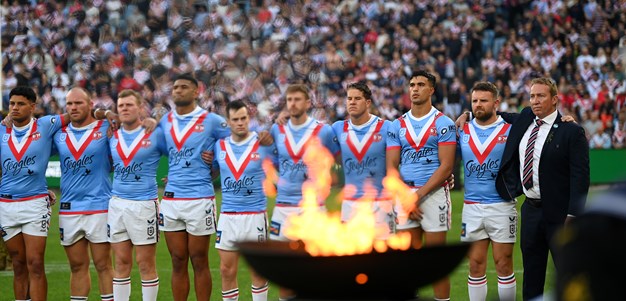Rugby League will deliver a powerful message on tackling domestic violence to grassroots clubs Australia-wide following yesterday’s launch of a State Government initiative by NSW Minister for Sport and Recreation, the Hon Graham Annesley MP.
Australian Rugby League Commission Chief Executive, Mr David Gallop, joined Minister Annesley at Rugby League Central to launch the DVD ‘Change Your Ways’ DVD, which aims to harness the power of Rugby League to change community attitudes about domestic violence.
Narrated by Gorden Tallis, ‘Change Your Ways’ features the stories of men from the Rugby League community who have experienced the effects of domestic violence - Jay Little of Wagga Wagga, Macquarie Scorpions President Kevin Maher and current Panthers player Clint Newton, who, despite not being a victim of domestic violence, has witnessed its impact.
An information pack including the DVD will be sent to more than 1100 grassroots Rugby League clubs in Australia as part of the game’s ongoing commitment to tackling the serious issue of domestic violence in society.
Already, thousands of men have been reached through Rugby League’s anti-domestic violence messages which are being delivered at all levels of the game from the Kangaroos and NRL Clubs through their support of the White Ribbon Foundation since 2008; education of NRL, Toyota Cup and NRL Club staff and players through the ‘Respectful Relationships’ program, since 2004; to the grassroots ‘Tackling Violence’ program, which started in 2009.
ARL Commission Chief Executive, Mr David Gallop, said: “Domestic violence is a serious issue in society and Rugby League is pleased to be able to work with the State Government to help deliver important messages like those contained in this DVD to help change community attitudes.”
In the DVD, Clint Newton talks about the long-term and ongoing impact of domestic violence on victims based on his relationship with a woman who had been a victim of domestic violence as a young girl.
“I got involved (in the project) because it’s an important cause … to get people to understand it’s an important issue in society,” Newton said.
“I was fortunate to have come from a family that was loving and caring; I’ve never seen it (domestic violence) at home.
“Unfortunately I have come across a lot of females who have been part of it … two to three years, 10 years down the track it’s devastating to see what it has done to their confidence and self-esteem.”
Kevin Maher speaks about his experience with domestic violence throughout his childhood; while Jay Little talks about feeling “helpless” growing up with domestic violence as well as his sister Natalie’s experience with an ex-boyfriend, which has left her confined to a bed in a nursing home, unable to walk, speak or eat unassisted.
“Men have got to pick a side; men are the problem,” said Maher, who was bullied as a child by his father whom he described as a “stay-at-home drunk”.
“90 per cent of domestic violence incidents are perpetrated by men, so it’s men who have to fix it.
“There are good men … who have to say violence isn’t acceptable against women or anyone for that matter.”
Minister Annesley said sport plays a vital role within our local communities and he is pleased the NRL has joined with the NSW Government to highlight the negative impact domestic violence has within the community.
“The ‘Change Your Ways’ DVD features high profile sporting ambassadors which include Gorden Tallis and Clint Newton taking a strong stand on the issue of domestic violence against women,” Minister Annesley said.
“This resource builds on the success of the NSW Government’s ‘Tackling Violence’ program, which utilises regional Rugby League clubs to provide domestic violence education and training to club players.”
The ‘Tackling Violence’ program is a community education, early intervention and prevention program, using local rugby league clubs to promote changed attitudes and behaviours to domestic violence in regional NSW communities. It is co-delivered by program Ambassadors David Peachey and Nathan Blacklock.
Since the project began in 2009, 1500 men from 37 Rugby League clubs have completed the workshop and 1800 have signed the code of conduct to refrain from domestic violence.

